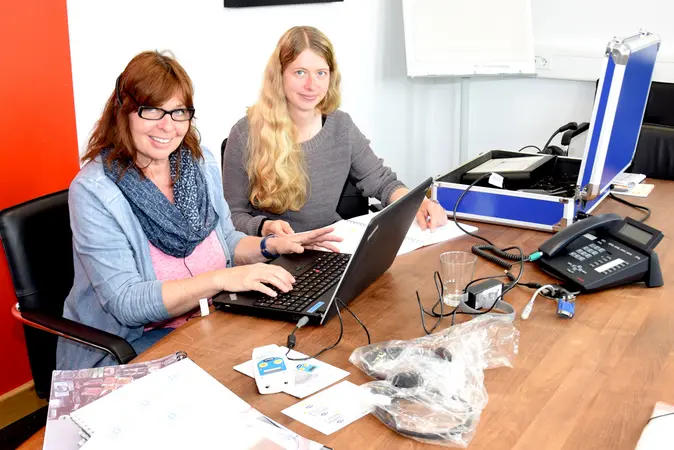For the functionally illiterate, they’re just meaningless letters.
Christiane Schuck (l.) and Dr. Melanie Boltzmann present the Bamberg literacy programme.
In addition to its sophisticated technology, the programme includes multi-volume handbooks for grammar and vocabulary practice.
Making Sense of Word Salad
Functional illiteracy is a problem found at the very centre of society: approximately 7.5 million Germans’ reading and writing skills are inadequate for participation in social life or the pursuit of a professional career. Psychologists at the University of Bamberg have studied the problem’s causes and have developed a programme that can help; AlphaPlus and AlphaPlus Job.
14.5 percent of Germans between the ages of 18 and 64 are unable or barely able to read and write simple words, sentences or texts. The problem is known officially as “functional illiteracy” and it means that common aspects of daily life – reading a railway or bus timetable for instance – are constant challenges that functional illiterates must face. Shame and psychological strain are pervasive.
The Bamberg Psychologists Dr. Jascha Rüsseler, Professor of General Psychology, and his colleague Dr. Melanie Boltzmann conducted research on the causes of this serious problem. For the first time, they were able to determine that the causes of functional illiteracy are not merely social, but also neurobiological in nature. Based on these findings, they have developed the AlphaPlus and AlphaPlus Job programme.
Using functional magnetic resonance imaging (fMRI) and electroencephalography (EEG), Rüsseler and his team examined which of the brain’s neuronal networks are involved in the learning process. “Our measurements allowed us to determine that the neurons responsible for auditory perception are less developed in persons with functional illiteracy than those of adults with normal reading skills,” says Rüsseler. “The former are unable to distinguish between acoustic stimuli that often last only milliseconds.” The result is that similarly sounding phonemes like “ba,” “pa,” “ta” and “da” can scarcely be recognised by functional illiterates. The ability to distinguish between these kinds of sounds, however, is a basic requirement for well-developed reading and writing skills.
AlphaPlus and AlphaPlus Job: literacy training for adults
Based on their findings, Rüsseler and his team have designed two programmes whose implementation they supported in a scientific capacity. The programmes are known as AlphaPlus and AlphaPlus Job. AlphaPlus is geared specifically towards the long-term unemployed who are considered unfit for work due to their functional illiteracy. AlphaPlus Job is targeted at the needs of employed programme participants and includes exercises like vocabulary training for words and expressions commonly used in particular occupational fields.
AlphaPlus and AlphaPlus Job sessions are meant to build on technical programmes co-developed by the Bamberg psychologists. A session begins with the Audiotrainer, a device that is used to train perception of optical and acoustic stimuli and distinctions between similar sounding phonemes like “ba” and “pa.” The computer program Orthofix is used to develop reading and writing skills, and to expand vocabulary. The Lateraltrainer, which was devised to improve cooperation between the two hemispheres of the brain, and a five-volume series of handbooks round out the programme materials.
Who says you can’t…
…teach an old dog new tricks? As far as reading and writing is concerned, this saying is fortunately quite irrelevant. The University of Bamberg psychologists have shown that after completion of their training programme, activation of the region of the brain responsible for fast and automatic recognition of words was considerably stronger than before. By the end of the programme, participants’ reading and writing skills had improved by one whole grade level. And as Jascha Rüsseler and Melanie Boltzmann explain, this is no minor feat: “This improved performance may sound small at first, but for an adult brain learning to read and write for the first time, it’s an enormous achievement.”
Contact:
Prof. Dr. Jascha Rüsseler
Professur für Allgemeine Psychologie
Tel.: +49 (0) 951 / 863 1991
jascha.ruesseler(at)uni-bamberg.de
Dr. Melanie Boltzmann
Wissenschaftliche Mitarbeiterin
Tel.: +49 (0) 951 / 863 2046
melanie.boltzmann@uni-bamberg.de
Notice
This press release was written by Kathrin Wimmer for the University of Bamberg’s press office and was translated by Benjamin Wilson. It may be used without restriction for journalistic purposes.
Please direct all queries or image requests to the press office either by email or telephone at medien(at)uni-bamberg.de, or +49 (0)951-863-1023, respectively.


